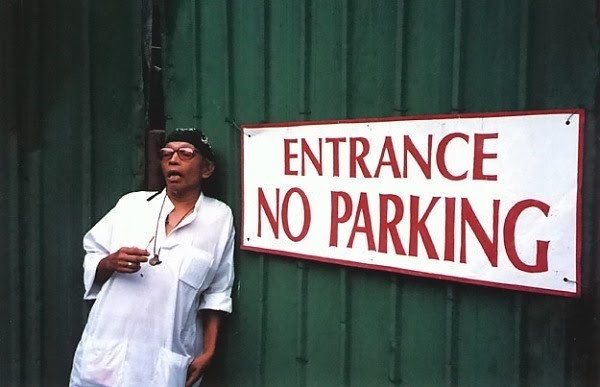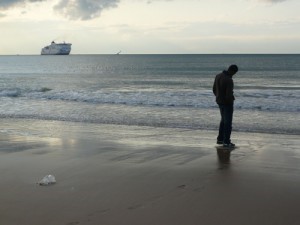01 Jun International Point of View Seminar 2012 Half Chronicle of an urgent seminar
“No man is an island, complete on itself; every man is a piece of the continent, a part of the mainland. If a portion of the land should be washed away by the sea, Europe will rest diminished, as if it was a promontory, or the house of one of your friends, or even your own; any man’s death diminishes me, because I am attached to mankind; and therefore, never send someone to ask for whom the bell tolls; it tolls for you.”
(John Donne quoted by Ernest Hemingway in For whom the bell tolls)
Report by Covadonga G. Lahera from Transit: cine y otros desvíos.
As the train travelled the distance that separates Barcelona from Pamplona, we raised several questions about what we were going to find this February in Navarra’s capital. We had decided to let ourselves to be surprised as much as possible. We only knew that the seminar’s aim was to take a tour about the trajectory of two film directors: the French Sylvain George, and another Malaysian, Amir Muhammad. We didn’t know anything about them, except that révolte qu’ils reposent (Des figures de guerre) (2010) by Sylvain had been enjoyed by a couple of fellow travellers who had attended the Xcèntric festival screening a year ago in Barcelona. We also knew that the film had won the past BAFICI award. We regretted not being able to attend the seventh edition of the festival in 2011, as the previous experience at the past IV, V and VI editions had been exhilarating. But during that year my bet was on Rotterdam´s IFFR festival and after it, my budget was almost in-existent.
Unfortunate news had come a few months earlier from the regional political authorities, when claiming monetary cuts -cause which seems to justify everything in recent times- had decided to abolish the annual Point of View Film Festival. The support that the festival had received since then, served to reach an agreement halfway between the parties: the festival would suffer a change of nature and would acquire a biannual nature. The organizers then envisaged an alternative way to complete the “empty years”. Therefore, that train wasn’t taking us to a festival anymore, but to a seminar whose character we still didn’t know, and which the third edition of the X Films call for entries had tried to include as part of its programme. This year has relied on the submitted proposal by Jorge Tur, the director from Alicante of If I were you, I would like the Cicatriz (2010). At the same, a growing support for the festival raised from a platform created by filmmakers and musicians, Offf PdV: ¡Retaguardia!, claiming for the festival’s continuity.
Under all these circumstances, several questions raised in our minds: which would be the new festival’s dynamics, considering that, according to the organizers, it was being reinvented? What criteria had been followed to decide to propose this unique “face to face” between this duet of directors so far away from each other? What kind of individual’s profile we would find amongst the audience? How would be the new and unique venue of the festival, the Film Archive of Navarre -whose location has also been the subject of local controversy-, well away from the city centre?
1. DRESS REHERSAL FOR UTOPY
During the railway line, we found ourselves immersed in a sort of drowsiness, like the one that affected the winnipeggers on Guy Maddin’s film (Point of View Film Festival, 2007). I was holding Laika, a graphic novel by British Abadzis Nick. I struggled to keep myself awaked and focused my attention on the adventures and misadventures of the dog sacrificed for the greatest glory in Soviet’s space history. Suddenly, Andrés Duque appeared by surprise and his iphone camera shot. It was later when we felt asleep. Andrés came across with Laika. Years before, in Pamplona, I saw two of his early works: The constellation Bartleby (2008) and Parallel 10 (2006). On this one, we discovered the measurement of the sun by a singular visionary Philippine woman, and Constellation … was the result of commission from the 1st edition of the Cinema and Space Film Festival, responding from literature and science fiction. Both works also pointed to the sky and to the future of a promising author.
The alarm sounds. My phone wakes me up. And we’re back on the train, returning. Retracing our steps, and with an overweight suitcase. We did not know exactly how, but Andrés was still there. He had not planned to pick up a train for the same returning date, but in the train we found images from his latest film: relatives that appear and disappear in a sea of glasses full of fish. The His Colour runaway dog (2011) had left me halfway, but Dress Rehearsal for Utopia (2012) is a consecration. The gloom was everywhere at that point, after André’s trip to Mozambique was interrupted by the illness and subsequent death of his father. African bodies, children’s gazes, pieces of other trips (a gondola in Venice) and from other hard drives, extracts from other Mozambican films… relied on a subjective corpus of ghosts, bodies and presences, creating a dance that bravely mocks death.
On Saturday, at the Cinematheque of Navarra , where we were pleasantly surprised to discover Carlos Muguiro presenting the “surprise film”, everyone knew that was precisely Finale essay for Utopia. Muguiro spoke about a film that invited you to silence and of a vine from the past that we can not take off our heads …
2. NOTES OF THE ELLIPSIS AND OTHER ISLANDS
Honest people. Honest directors. The essay film as a fighting tool. Film as a process requesting a symbiosis with a society pending to come into terms with a list of its past and present. Film as a vindication of bodies and voices ignored that inhabit in our margins. The colonial and postcolonial issue claiming a vindication and an update on what was learned. The essay as a trial of evidence and self-conscious effort: Amir quoting Chris Marker or Welles’ F for Fake (1973), Sylvain awakening the American underground referring to Pasolini and Armand Guerra …
Amir Muhammad outlines an almost permanent smile and spreads a pleasant bonhomie. During the master class he taught and at the round tables with Sylvain George displayed a constant and sharp sense of humour -that permeates in all his films as well-, and also proved to be a warehouse of quotations from celebrities well integrated into his speech. He is a Malaysian from the field of publishing that began in the essay film after reading an article that opened his eyes. At his mid-teens, Amir had begun to question the “local truth” following an incident occurred in 1987, in which a soldier with his rifle triggered a state of panic and paranoia in Kuala Lumpur. Amir wanted to see certain things and, as they didn’t exist, he decided to start filming them himself: “The essays are necessarily related to the ego. You’re telling someone that your point of view is important enough for them to be quiet and listen, if only for a few minutes. “ His pretension, to encourage a kind of politicisation without politics amongst his citizens.
George Sylvain, a Frenchman with a more serious look, holds, like Muhammad, a strong knowledge of the history of cinema (both displayed their skills in their lectures of a more or less academic approach), felt the urge to portray the protagonists of the recent social movements that have happened in his country without exploiting the use of the immigration issue that politics media institutions are making. With this project, which encompasses most of his production to date-and, specifically, all screened in Pamplona: L’impossible arrachées-Pages (2009), Les Eclats (gueule Ma, ma révolte, mon nom) (2011 ), the already named in révolte réposent qu’ils …, short films and previous editing-he has spent all these years working. Also reading began to forge his vital and cinematographic search when some suspicions were activated. The French media coverage granted to the events in the Gallic port of Calais in 2009 with immigrants from various African and Asian countries left him uneasy and decided to see it for him-self to realise how much truth was behind the official version, which contained a dubious tendency to stigmatize immigrants.
That’s how curiosity gave birth to this urge, from social worker to filmmaker, and led him to a period of field immersion, to spend long periods and live for three years with the “illegal” inhabiting those inhuman camping spaces and to investigate the random people and mass arrests devices based solely on the appearance. And Sylvain, who had friends belonging to the second generation of Algerian immigrants, reaffirms his cinematographic attitude encouraging each person to find means to self-define and interact with the surrounding world. Both he and Amir have found it in separate and specific film essay proposals –the “most direct” way to communicate-, according to them, encouraging subjectivity and sensitivity proposals that address essential issues of our times. And what may not be seen, can be even more relevant…
Furthermore, the presence of certain words it is also important for both of them. Both Sylvain and Amir make a significant use of intertitles, abundant in fragments of literary sources, essayistic and poetic character. Both emphasize the value of words and active communication to challenge the official discourse of their respective microcosm and by doing so, they offer a way to destabilize the established order. Playing with the standard frame speed allowed them to go straight to the point, go back and introduce a touch of parody in the story –in Amir’s case-; encourage reflection or draw our attention to certain moments captured that freeze or occur with greater severity in front of our eyes – Sylvain’s case and, moreover, their use of white and black. Both stress the importance of dates and registrations, as necessary information to place each piece in its real context, and after all, transcend it to a self reading that is not imposed, but only suggested. And “after awakened, that does not mean we must stop dreaming”, as Amir quoted, although we can not withdraw our gaze from the river with flooded waste and remains that threatens to overflow. That’s how also concludes Malaysian Gods (2009).
3. ANYTHING TO DECLARE?
In The Human Issue (La question humaine, 2007) there is a sequence in which an Africans mass arrest occurs in the interior of a French public space. An insert of a fragment of reality is placed, but the protagonist, in the fictional world, do not realize this fact. For Nicolas Klotz and Elisabeth Perceval was key to highlight the inexistence of a common ground between immigrants and local citizens: the psychologist in charge of human resources department of a large multinational not even see the detainees despite being there. The absence of this space precludes the dialogue, the empathy with the “other” and the knowledge. Precisely, and through his films, Muhammad Amir and try to show the existence of that space to inhabit that some strive to conceal and silence. A new human pyramid to develop…
Amir’s films, which proudly wears the label of being the first Malaysian Director censored (his film The Last Communist-Lelaki komunis terakhir, 2006 – was criticized “for not being violent enough”), intends to claim a space for exchange and real understanding that has no translation in the political and social reality of contemporary Malaysia, and also intends to build bridges with neighbour countries and related cinematography such as Indonesia and Singapore. During his instructive master class around Malaysian film history, of which the earliest representatives date from the mid 20th century, Amir showed again his constructive optimism: “There are many films that we have not done yet.” His next project is titled I’m Still Jewish, in which his 4,954 Facebook followers will be involved in the making process; this will be his first fiction film.
In addition to his cluster of short 6horts (Amir challenged himself to make a piece per month), the retrospective dedicated to the Malaysian filmmaker in Pamplona was completed with the showing of three of his films: Malaysian Gods, The Big Durian (2003) and The Last Communist. Like many other countries, Malaysia seemed to me very, very far away, as well as its melting pot of races, languages and religions (mostly Malay Muslims that speak Malay- religion and language of the country, respectively-, Buddhist or Taoist Chinese, Hinduism Indians practitioners speaking Tamil). Amir shows a great ability to encourage a reflection based on the testimonies of private citizens (from a projectionist to a barber, through a car cleaner, a cashier, a newsstand, a National Guard member or a balloon vendor) appeared in the film to tell their own story. His perspective on reality and certain specific events that the filmmaker is interested in addressing in his films. Amir does not hesitate, moreover, to include bombastic musical performances in his films and plays to camouflage actors amongst non actors. The way in which he incorporates music-in a free-jazz code- and silence, are also clear identifying marks of Sylvain George’s films.
Sylvain speaks of concrete actions and minority gestures as resistance, “almost invisible, fragile, but present and protest.” His exercise lies in the way he captures them in order to propose an alternative manner of thinking that has more to do with what actually happens. Decolonize the mind, then. The people he lived with in Calais, they have now a face that is closer to reality than what shown by the press. They struggle for survival and, simultaneously and gradually they lose their identity because travelling to the supposed first world means, for the moment, swallowing their past and present and physically erase their fingerprints. To burn them.
When is the right time to press the REC button on the camera? According to Sylvain it has to do with a combination of intuition and respect. Legally, a hand-held camera can record in French public places if you have an identification ID, although it is actually a fictitious freedom. Sylvain seeks for spaces between the links of the chain and asserts that his films are not films about something but his interest for a certain phenomenon. Not representation but presentation. For the French director, it is essential to organize pessimism. The voices of “the round of the stubborn” (corresponding to the “outraged” in our country), the voices of the immigrants turned into today’s slaves. For him, it is urgent to pause history, look at our times as a foreigner, to disrupt the conventional flow of time and carry out a restoration of human justice as opposite to (in) Justice, “bring out the utopia that is hidden in the heart of the present and, through the cinematic device, propose a new order of the world.”
We returned to the train. By then it was a train much slower and heavier. We had missed other friendly faces that felt uncalled by the character of the seminar and for the absence of recognizable names and settled in their ranks. However, for us, Pamplona, once more, gave us a break and reopened our minds.






No Comments